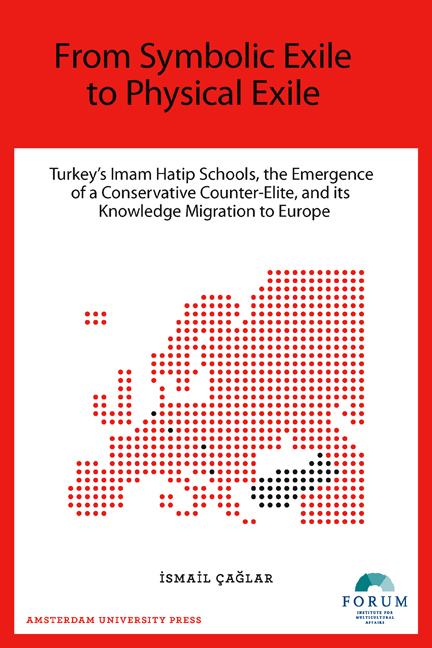 From Symbolic Exile to Physical Exile
From Symbolic Exile to Physical Exile Book contents
- Frontmatter
- Contents
- Foreword: Pious Muslims as a Bridge between Turkey and the West: The Remarkable Case of the Imam Hatip Graduates Studying in Europe
- Introduction
- 1 Historical Background
- 2 İHL Graduates in Vienna
- 3 İHL Graduates in Sarajevo
- 4 İHL Graduates in Other Countries
- Conclusion
- Notes
- Bibliography
- List of Acronyms
- Basic background Information on the Key Respondents
- Index
- Frontmatter
- Contents
- Foreword: Pious Muslims as a Bridge between Turkey and the West: The Remarkable Case of the Imam Hatip Graduates Studying in Europe
- Introduction
- 1 Historical Background
- 2 İHL Graduates in Vienna
- 3 İHL Graduates in Sarajevo
- 4 İHL Graduates in Other Countries
- Conclusion
- Notes
- Bibliography
- List of Acronyms
- Basic background Information on the Key Respondents
- Index
Summary
A news report on the IHL graduates studying in Vienna, broadcast by the Turkish state television channel TRT, described them as ‘young Turks, who have completed their studies, which they started with a lot of difficulty in Vienna, the capital of Austria, a place that was completely unknown to them when they left’. The report made no reference to their having graduated from İHLS and the fact that they had been barred from continuing their studies in Turkish universities as a result of the policies of the Council for Higher Education (YÖK), nor to the fact that these policies have recently changed.
The reporter's talk of ‘young Turks’ (genç Türkler) appeared a deliberate reference to the Young Turks (commonly called Jöntürkler), the bureaucratic and military reformers of the Ottoman Empire who had ushered in modern Turkey. Many of the Young Turks had also studied in Europe, although unlike the IHL graduates, they had been sent abroad by the state, in a drive to train modern bureaucrats. The Young Turks returned as reformers and revolutionaries, obsessed with the ideal of saving the state. The IHL graduates in Europe, not unlike those predecessors, claim that they feel morally obliged to serve (hizmet etmek) the Turkish people and state, as was reported in the preceding chapters.
The parallels between the Young Turks and the European Imam Hatip graduates are not a simple coincidence, but illustrate the paradoxical relationship between the Turkish modernization project and the continued existence of the conservative masses, and the paradoxical role played by the İHLS in the course of Turkish modernization. On the one side, there is the official ideology of modernization and reform, which aimed to build a nation and its state on the ruins of the multi-ethnic and multi-religious Ottoman Empire (which in its final years had become more Sunni and Turkish than it had ever been). On the other side, there is the story of the survival of the conservative masses in the new republic. Paradoxically, the Imam Hatip Schools, which were designed to be part of the republic's effort at modernization and enlightenment through education, became crucial to the social reproduction of Turkish conservatism and to the empowerment of the conservative masses.
- Type
- Chapter
- Information
- From Symbolic Exile to Physical ExileTurkey's Imam Hatip Schools, the Emergence of a Conservative Counter-Elite, and Its Knowledge Migration to Europe, pp. 119 - 124Publisher: Amsterdam University PressPrint publication year: 2013


